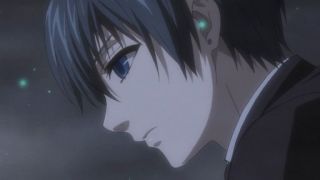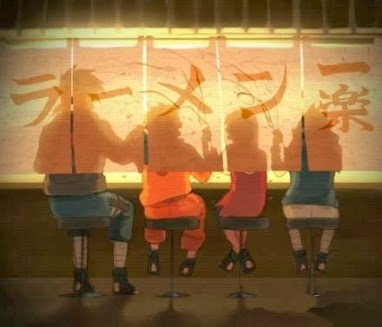[A little note here: at the time I wrote this blog, I’d only watched the first season of Black Butler. I’ve since seen all the rest of the existing anime and read quite a bit of the manga. So yes, I know the end here is not the end-end, but I think the point still holds]
I did not expect to like Black Butler. I figured it would be weird and lascivious and funny (it was), but I didn’t expect it to be moving or witty—and it was both those things. In spite of the absurd, dark humor, Black Butler can actually get quiet, and it leaves a lot unsaid. In those quiet spaces, I found myself feeling…disturbed. And, the biggest surprise of all, I was still wondering what made it so disturbing weeks after I watched it.
I’m starting to figure it out, though. I’ve been thinking especially about that last episode of the first season (I’ve only watched the first and second season, by the way, so it might take a turn that screws up my analysis here. If so—meh!). In this scene, Ciel has accomplished his revenge, and Sebastian is rowing him across a river to the place where Sebastian plans to eat Ciel’s soul. The physical and the spiritual are all muddled here—the river could be a real or it could be symbolic…and it’s hard to wrap your around what eating a soul looks like. We get the feeling that it’s not going to be like rainbows flying into Sebastian’s mouth, but neither is the soul some corporeal thing that can be wedged between a couple buns. At any rate, the journey toward this soul-eating moment which will break the partnership between Ciel and Sebastian is a damn quiet one. As they row, little lights like fireflies pass them, and Ciel asks what they are. Sebastian explains, without sentiment, that they are the manifestation of his encounters with other souls—the people who have passed through his life. Ciel admits that he finds them “pretty,” which is notable considering that Ciel’s character is a militant pragmatist, the aesthetics of his upper class life being an expectation rather than a thing to appreciate or comment on. Ciel is obviously regretting some things here, even though he knows this regret is futile.

Typically, anime is not especially quiet when it comes to emotions. Characters scream each others’ names in anguish (INU YASHA! INU YASHA! Comes immediately to mind). They apologize to each other and weep for each other and kill each other and lust after each other wildly and openly and it’s all so wonderfully melodramatic. And I love that. But in the scene that I just described, no one is doing any of that. Something very sad, and likely very violent is about to happen, and yet the characters are speaking quietly about the little lights passing them. The scene even looks soft, the lake they row across is misty and gray. And in all this softness and quietness and confusion about what is literal or metaphorical or physical or spiritual, I can’t help but think, what if the contract between Ciel and Sebastian is itself a metaphor? After all, Ciel clearly feels attached to Sebastian; in one episode, a magic daguerreotype camera reveals that Sebastian is the creature from “the other side” that Ciel thinks about the most (not his dead parents). In another episode, he is frightened about something and demands that Sebastian stay in his room while he falls asleep (my four year old son does the same to me). And for Sebastian, it’s not an overstatement to say that he adores Ciel. To adore and to protect a person as long as they live because you see the beauty in their most fundamental self (their soul)? How different is that from love? I think that is the metaphor: the contract they have joined in is representative of the real sacrifices and commitment of regular, run-of-the-mill, human devotion. (And for the record, I have to clarify that this devotion, in my interpretation, is more parental or brotherly than romantic—it’s not that the other, ickier reading isn’t there, it’s just that I see more evidence of the former).

I realized that the show is working some magic. One hand is flashing romance, murder, Victorian horror and eroticism, lots of clever references to British literature (most notably P.G. Wodehouse and Shakespeare). The other hand is the one doing the trick, though. The other hand is creating this metaphor, so when the show’s over-the-top theatrics fall away, in this quiet moment on the river, the sadness and complexity of this metaphor hit you all at once. Of course, quiet or not, Black Butler resists sentimentality. Sebastian is a demon, and as he’s promised throughout, he fully intends to make Ciel “one hell of a feast.” In the final, silent seconds of the season, Sebastian brushes away Ciel’s eye patch to reveal the symbol of their pact, and remove his soul. And I’ve figured out why this moment is so upsetting to me. It is devastating partially because I hoped that Sebastian would change his mind, and not devour Ciel. It is also devastating because I bought into the metaphor, and I hope Sebastian will not change his mind—in Black Butler’s world of comic horror, Ciel and Sebastian’s pact, like love, is the force that civilizes them, that keeps them from being monsters. In the end, it must be honored.


